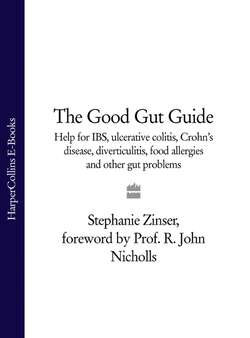Читать книгу The Good Gut Guide: Help for IBS, Ulcerative Colitis, Crohn's Disease, Diverticulitis, Food Allergies and Other Gut Problems - Stephanie Zinser - Страница 16
Diarrhoea
Оглавление‘Everyone knows it – first, you get a gripey feeling deep in your belly, then you know you’ve got just a few seconds or less to get yourself into the nearest loo. It’s something that babies in nappies wouldn’t care about, but as an adult it becomes a real social problem. If it’s an acute case of food poisoning or holiday tummy it’s bad enough, but to have it constantly is a different ball-game altogether. It changes your life completely. You can’t go anywhere or do anything without military planning and knowing where every toilet is located. You become really good at inventing excuses and avoiding intimate situations. I’ve even had to resort to carrying spare underwear and wet wipes because of the odd disaster.’
Graham, 22, who suffers from severe, urgent diarrhoea caused by ulcerative colitis
Diarrhoea is defined as ‘frequent passing of abnormally loose or watery faeces’, and most of us easily know when we’re suffering from it! The urge to get to the bathroom quickly is normally a main feature and occasionally the first time we know we’ve got diarrhoea is when we’re ‘caught short’ or break ‘wet’ wind. Faecal incontinence (the medical term for being caught short) is more common than you might think, affecting one in 20 of us at some time or another.
Diarrhoea is often, though not always, accompanied by stomach cramps and, if it is caused by food poisoning, food intolerance or a flu-like illness, you may feel sick and throw up as well. Diarrhoea can be acute, starting suddenly and lasting only for a short period of time, or chronic and linger for weeks, months or years.
